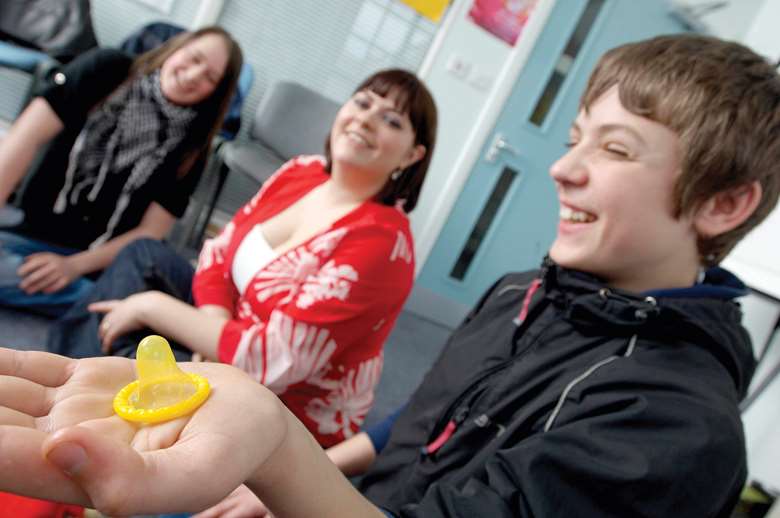Compulsory relationships education to include mental health sessions
Joe Lepper
Thursday, July 19, 2018
Compulsory relationships and sex education in schools will include sessions on mental wellbeing, the government has revealed.

Under the plans, all schools will have to teach children health education, covering both mental and physical health, as part of lessons that will also include relationships education in primary schools, and relationships and sex education (RSE) in secondary schools.
Schools will be able to teach the new lessons from September 2019 when support materials for teachers will be available. From September 2020, the lessons will be compulsory.
The government said compulsory mental health education will help pupils "to build mental resilience and wellbeing".
The plans follow the publication of the government's December 2017 green paper, Transforming Children and Young People's Mental Health, which outlined proposals to boost the role of schools in supporting the mental health needs of children and young people. This includes appointing a designated mental health lead in every school and college.
Anna Feuchtwang, chief executive of the National Children's Bureau, urged the government to ensure that funding is available for training to help schools deliver the lessons.
"Given the stretched start date announced for compulsory relationships RSE, it is essential that momentum is not lost - time is still ticking for children and young people," she said.
"High quality RSE, something the Sex Education Forum has repeatedly called for, will depend on investment in training for schools and we urge the government to make a commitment to this.
"It's great news that health education is going to be guaranteed for all children and young people, helping them develop physical and mental wellbeing, and to enjoy positive relationships.
"But there is a lot of detail that needs to be worked out too - for a start, teachers are crying out for clear guidance on what exactly they should teach as they build their pupils' understanding of complicated aspects of relationships and sex, from understanding puberty to protecting themselves from harm."
Click links below for related CYP Now content:
Special Report: PSHE Education
PSHE Education: Policy context
Feuchtwang also wants the government to ensure economic education is included to help young people develop "essential life skills".
Maria Miller, chair of the women and equalities select committee, called for schools to start new lessons as soon as possible, rather than waiting until they are compulsory in two years' time.
"I would urge schools to start implementing the new RSE guidance as soon as is practicable and not wait until it is in force," she said.
"In addition, new safeguarding guidance on sexual violence will be in place this September, so schools should prioritise making sure their policies and procedures clearly address sexual harassment and sexual violence, and the culture that underpins them.
"All children have the right to grow and learn in a safe and supportive environment."
Barnardo's chief executive Javed Khan said that young people using its services had requested that mental health was included in the lessons.
He added: "It's vital teachers have quality resources and proper training so they can deliver sensitive subjects that are age-appropriate and answer any questions children have confidently.
"Schools must communicate regularly with parents to help them feel comfortable about what their children are being taught."
Plans to introduce statutory RSE in English schools were announced in February 2017 by then Education Secretary Justine Greening, who said they would be compulsory from 2019.
Paul Whiteman, general secretary of the National Association of Head Teachers, said he was "disappointed" that the deadline has been pushed back a year.
He is also concerned that the new lessons are not within the context of the current personal, social, health and economic (PSHE) lessons.
"Today's announcement is a step in the right direction, but it does not go as far as we would like it to," he said.
"The evidence submitted from our members to the recent consultation made it clear that the best way for schools to teach relationships and sex education is within the context of PSHE, and we remain disappointed that the government is still stalling on making PSHE statutory for all pupils in all schools.
"PSHE lessons in schools provide protected curriculum time to teach children and young people about real life issues, including relationships and sex education, physical and mental wellbeing, online safety, fake news, financial literacy and preparation for the workplace. These are all essential to a rounded education and the wellbeing of all pupils."
The compulsory lessons will include sessions on online safety, covering issues such as keeping personal information private and child protection.
LGBT issues will also be covered and draft guidance around the lessons will be subject to a 12-week consultation.
"I want to make sure our children are able to grow up to become happy and well-rounded individuals who know how to deal with the challenges of the modern world," said Education Secretary Damian Hinds. "Part of this is making sure they are informed about how to keep themselves safe and healthy and have good relationships with others."
"Many of today's problems did not exist when we last gave schools guidance on how to teach relationships and sex education 18 years ago. The action we're taking is important to help support teachers and schools design a curriculum that will enrich their pupils in an age-appropriate way.
"Good physical and mental health is also at the heart of ensuring young people are ready for the adult world. By making health education compulsory, we are giving young people the tools they need to be ready to thrive when they leave school."




